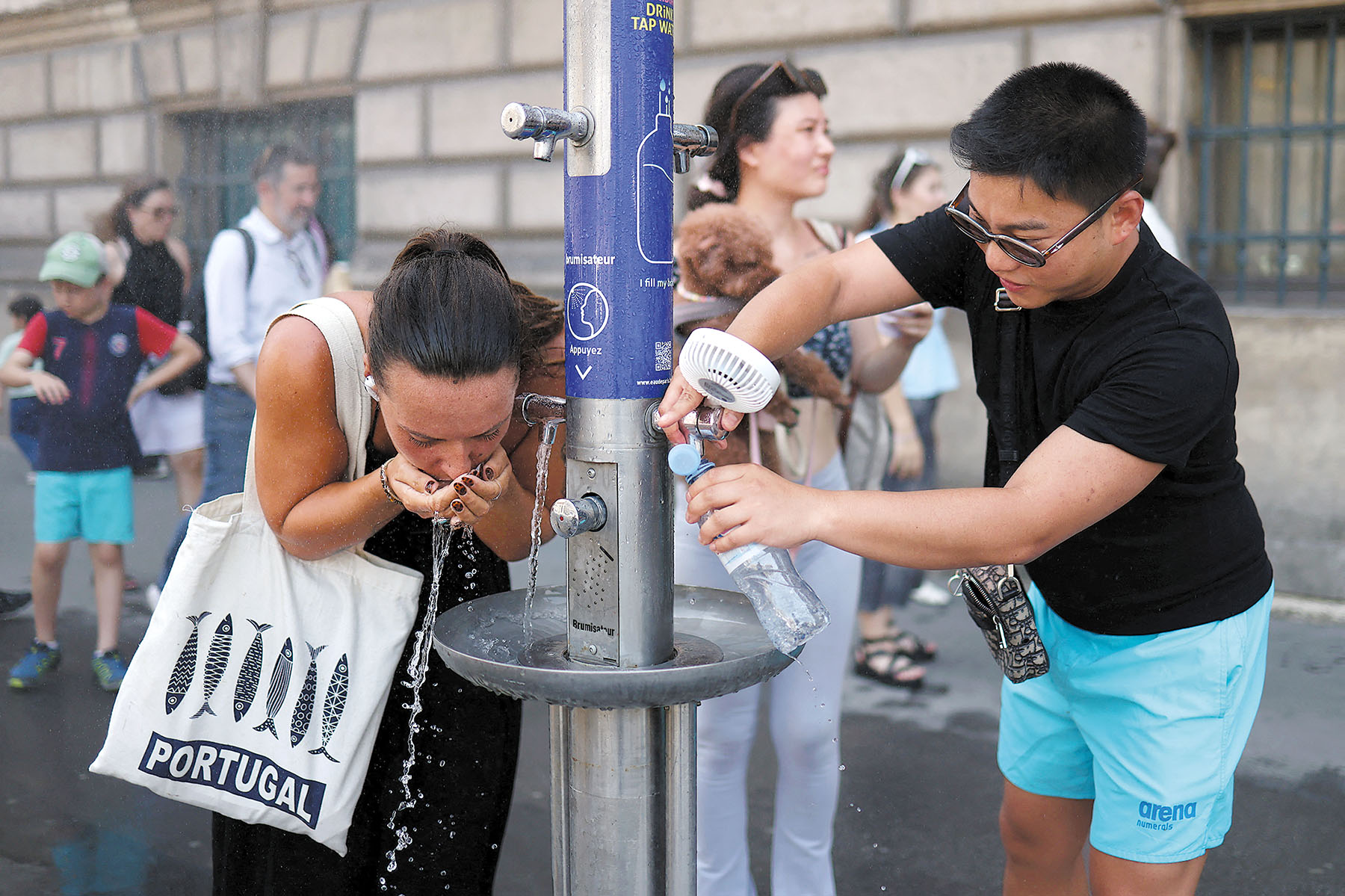As severe weather increases on continent, debate rages over best approach to changes

Every year in mid-June, Emily Wu, who lives in Germany, plans a family trip before the summer's peak holiday season arrives. This year, after conducting a lot of research, she decided to take her 6-year-old son to the Spanish island of Majorca, famous for its beautiful sandy beaches and crystal clear waters.
"But I didn't expect the weather to be so hot," said Wu. "I searched the web and it said the weather is warm in June. I expected it to be 25 C to 30 C, but during our six-day stay, we experienced highs of over 35 C."
Days after Wu's family left Majorca, a 34-year-old Dutch tourist died from heatstroke while hiking near the inland town of Soller on June 26.
Wu said that when she returned to Germany she was expecting cooler weather, but was instead welcomed by a heat wave warning. In the last week of June, the historic town of Renningen, where she has lived for five years, issued an alert advising parents to take their children from school to home. The children were advised to stay inside and drink more water.
READ MORE: Extreme heatwaves underscore climate urgency, demand action
The extreme weather was caused by a "heat dome" that has shrouded Europe and stayed longer than previous years.
In Germany, Greece, and France, authorities have evacuated homes and dispatched water-bombing aircraft with firefighters to battle wildfires since June. Health experts have advised limiting outdoor working hours, and told deliverymen to avoid unnecessary travel during the day.
Heat dome
The sweltering June temperatures in Europe have been attributed to a weather phenomenon known as a heat dome, which is created when an area of high pressure stays over the same area for days or even weeks, trapping very warm air underneath.
Pressure systems usually move from west to east, but they can occasionally get blocked and intensify the heat.
Jason Nicholls, a senior meteorologist and lead international forecaster at AccuWeather, a commercial weather forecasting service, told The Independent news website that a strong area of high pressure from Morocco had built over Western Europe at the end of June. The system extended through Spain and Portugal into France, and has spread across Germany and Italy.
Europe is currently the fastest-warming continent and has been warming twice as fast as the global average since the 1980s, according to the 2024 European State of the Climate report released in April.
A total of 23 of the 30 most severe heat waves in Europe since 1950 have occurred since 2000, with five between 2021 and 2023, according to the World Meteorological Organization Europe Regional Climate Centres.
Europe's proximity to the Arctic could be one contributing factor, DW News reported, citing scientists from the EU's climate monitoring program, Copernicus. As more ice melts there, fewer solar rays are sent back into space and more heat is absorbed by the surface, causing the surrounding region to further heat up. The oceans are also warming, which contributes to heat waves and more extreme droughts, particularly in Southern Europe.
Heat waves can lead to wildfires, droughts, sudden flooding, and air pollution, all of which have impacts on health, livelihoods, and property.
In the WHO European region, heat-related mortality has increased by around 30 percent in the past 20 years, and heat-related deaths are estimated to have increased in 94 percent of the nearly 1,000 areas monitored, said the 2023 European State of the Climate report.

Climate challenges
The high temperatures have shut down critical infrastructure across the continent, such as rail lines, bridges, airports, and nuclear power plants, partly because many facilities were just not designed to cope with the extreme heat.
Yang Yi, a podcaster based in London, shared his experience of being stuck in a stuffy train bound for Brighton on the southern coast of England on June 21.
"It was a bright sunny day, and I just thought of taking my dog to the seaside town for a walk," said Yang. "But I didn't expect that we would end up walking on the rail track."
Within 30 minutes of the train departing, a fault near Loughborough Junction in south London caused all services to come to a halt. Soon, the air-conditioning on the train was down, and Yang was stuck in a train full of people.
"After another 20 minutes waiting in the stifling hot cabin, people became upset," recalled Yang. "Then (there was) a cracking sound, some people broke the emergency button, and pushed the doors open to let fresh air in."
After waiting for another half an hour, a cabin announcement said passengers could evacuate the train.
"I took my dog, followed people getting out of the cabin and walked along the track for about 200 meters to an emergency exit, where police, an ambulance and fire engines had all arrived," said Yang.
On June 30, speed restrictions were imposed on two main lines out of London as temperatures on the track neared 60 C. The UK's Network Rail stress tests its steel rails based on the mean summer track temperature in the UK, which is 27 degrees. Heat waves can bring disruptions to rail services, with tracks sometimes buckling.
Being comfortable inside their own homes is another challenge Europeans are facing this summer.
Most European homes were built to retain rather than expel heat, and typically don't have air conditioners. Only around 5 percent of homes in the UK have cooling systems, many of which are portable AC units, and in Germany, that figure is 3 percent, CNN reported.
Sun Yuzhen, who has lived in Italy for nearly 10 years, said: "Springs have become shorter, and it feels like summer comes all of a sudden after May."
"In the past two or three years, more and more people are considering buying a mobile air conditioner, including me," said Sun, who now lives in the old town of Naples. A small mobile air conditioner doesn't require installing an outside component so there is no need to make a hole in the wall, she explained.
"It's a good choice for us, because many people living in old houses face difficulties in installing air conditioners due to restrictions on older buildings," she said.
"However, the growing consumption of electricity, thanks to the rising number of mobile air conditioners, has brought two blackouts recently in Naples."
Since home cooling systems have not previously been a necessity in Europe, making buildings and other infrastructure more resistant to heat will require massive renovations.

Change of lifestyle
"We haven't been in the habit …of thinking about how we stay cool in the summer," Brian Motherway, head of the Office of Energy Efficiency and Inclusive Transitions at the Paris-based International Energy Agency, told CNN.
In France, a debate "Heat wave: Should France be air-conditioned?" was recently discussed on many television channels. Even though air-conditioning companies were overwhelmed with requests during the heat wave, many people expressed concern that its widespread use in homes, industry and data centers would result in a surge in electricity demand, and further exacerbate global warming.
Zheng Kaiyun is a civil engineer who lives in Paris.
After seven years without an air conditioner, and serious consideration of whether to buy one, she eventually bought a fan. To get cool air circulating through her home she takes ice cubes from the fridge and puts them in front of the fan.
"Last week was probably the hottest, with temperatures surpassing 37 C, and the weather forecast said the temperature will again rise above 30 C next week," said Zheng. "We used to only have two or three days of weather above 37 C before, but now the heat comes earlier and more frequently."
Working in the construction industry, which is one of the major contributors to greenhouse gas emissions by sector, Zheng said her previous employer, a major construction company in France, has been using low-carbon concrete for most of its projects.
"A calculation of total carbon emissions is now included in almost all bidding for new construction projects, and lower emissions could help the bidder get the deal," she said.
That change is just one European effort to reduce carbon emissions over the past decade after the landmark Paris Agreement was adopted by 196 parties in 2015. The agreement aims to limit global warming to well below 2 C, preferably 1.5 C, compared with pre-industrial levels.
A set of policy initiatives, also known as the European Green Deal, was later adopted by the EU to achieve climate neutrality by 2050.
In 2021, the EU Climate Law went into force, which made the goal in the European Green Deal legally binding, and sets the intermediate target of reducing net greenhouse gas emissions by at least 55 percent by 2030, compared with 1990 levels.
On July 2, as the continent was still gripped by this year's first heat wave, the European Commission proposed an amendment to the EU Climate Law, adding another climate target of 90 percent reduction in net greenhouse gas emissions by 2040.
The amendment also allowed EU countries to use carbon credits purchased from developing nations to hit their emissions goals. Some view this as a necessary flexible measure while others consider it a step backward, calling the move a shirking of responsibilities by polluting at home while planting trees abroad to buy a clean conscience.
Acting responsibly
The European Union has a historical responsibility to cut emissions at home, said Thomas Gelin, a Greenpeace EU campaigner.
"The EU's 2040 climate targets should drive a shift away from fossil fuels, starting with an EU ban on new fossil fuel projects, toward renewables and energy saving, to cut people's energy bills, make their homes easier to heat and cool, and clean the air they breathe," he told the Guardian.
Cheng Zhao, a foresight expert at a social business and a project coordinator with a think tank that focuses on sustainability and business in Germany, said climate topics were once top priorities for the government.
ALSO READ: US cities face record high temperatures on worst day of heat wave
However, in recent years Germany's stagnant economy and other issues, such as immigration, have topped the public agenda.
"Now, discussion will fade after the extreme weather passes," said Cheng, who thinks raising public awareness on climate change remains a big challenge.
"Without more media exposure, many people tend to feel they are doing it alone, and they feel that their efforts are meaningless," she said.
"But actually, an individual's green efforts and sustainable purchasing habits pass on strong incentives to companies, and do make positive changes in production and supply chains."
Cheng added: "If our ways of life are not sustainable, we are depriving the rights of our next generation, because extreme weather will become normal weather in the next 20 to 30 years. But if all of us act together, we've still got a chance to avert the worst future scenarios."
Contact the writers at xingyi@chinadaily.com.cn


